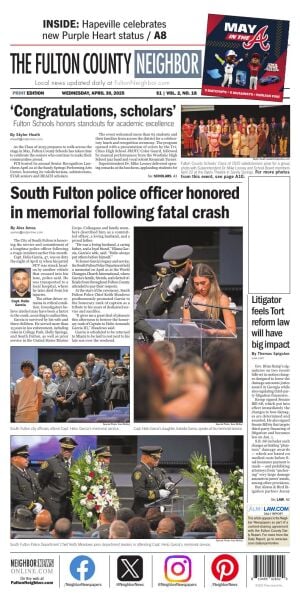Cobb County voters who live in District 4 will decide who will represent them on the Cobb Board of Commissioners in the April 29 special election. Incumbent Democratic Commissioner Monique Sheffield, a Realtor, is being challenged by Republican Matthew Hardwick, a video engineer. To aid voters in their decision, the Journal sent the following questions to both candidates. Here are their responses:
Matthew Hardwick (R)
Occupation: Video engineer
Age: 60
Residence: Smyrna
Family: Wife Marissa; five adult children
Education/military experience: U.S. Army Veteran, served combat arms; holds degree in electronic engineering
Have you served in elected office before: Not public office, previously served as GOP precinct chair of State House District 41, but serves as Vice President of The Cobb County Georgia Republican Assembly and Georgia State GOP Committeeman
Q: What are your thoughts on what’s been proposed for the Unified Development Code so far? What ideas do you like and which ones do you think need to be reworked?
A: I am unfamiliar with that code. Does that have to do with Cobb County?
Q: How do you plan to address the shortage of affordable housing, especially for essential workers?
A: We need to follow the law when it comes to zoning variances. Because we have not, we lost our low-income housing assistance.
Q: How do you plan to balance new development with preserving the character of existing neighborhoods?
A: By limiting high density housing increase. We are nearly out of space. The only way we can prevent Cobb County from becoming Atlanta, is to curb high density housing now.
Q: In light of the recent failure of the Cobb M-SPLOST, what alternative strategies do you propose to improve public transit and reduce traffic congestion?
A: We need to peel back the surveys of all Cobb roadways. This is crucial for safety purposes as well. We have a speeding epidemic on our hands and MANY pedestrian deaths by vehicles in our county. These surveys on the books expire, and, when they do, they need to be redone in order to consider our population growth and corresponding traffic congestion. Also, fewer buses on the roads as the ones we have are totally underutilized. Cobb Linc is working on a sort of Uber-like public transportation that is showing promise as well.
Q: Do you support the implementation of a stormwater fee as proposed by staff last year? How would you modify the plan, if at all?
A: I do not support a storm water fee whatsoever. We simply need to follow code; no more building on wetlands.
Q: How would you ensure transparency and accountability in county decision-making?
A: Make sure all measures that the Board is working on are bulletin boarded. Have a frequent newsletter that is emailed out to county citizens with an option for anyone to subscribe to. Provide more timely announcements of all upcoming board meetings as well as official board events.
Monique Sheffield (D) (I)
Occupation: Real estate broker
Age: 57
Residence: Mableton
Family: Husband Eric; mom
Education/military experience: B.S. in criminal justice
Have you served in elected office before: Sitting District 4 Commissioner
Q: What are your thoughts on what’s been proposed for the Unified Development Code so far? What ideas do you like and which ones do you think need to be reworked?
A: The first phase of the UDC streamlines the administrative process for development applications, including rezonings, special land-use permits, subdivisions, and zoning variances. A key feature is the new requirement for applicants to host a neighborhood meeting before formal review, encouraging early and meaningful community engagement. This is one of the components I fully support. Far too often, residents are unaware of proposed developments. While the county posts notices, many people don’t see them or understand their significance. Requiring developers to engage the community early improves transparency and ensures residents have a voice.
The second phase of the UDC will focus more deeply on zoning and development standards. That’s where we’ll take a closer look at shaping future zoning ordinances — ensuring they reflect both the growth we anticipate and the values we want to preserve. It will be a critical step in framing the future of development in our county.
One area that may need additional refinement is the treatment of accessory dwelling units (ADUs). As we address housing shortages, ADUs offer a viable path to affordability. However, their implementation must align with existing codes and zoning ordinances. We must strike a balance between expanding housing options and preserving the character of established communities.
Q: How do you plan to address the shortage of affordable housing, especially for essential workers?
A: Addressing the shortage of affordable housing, especially for essential workers, is a top priority. As a member of the Atlanta Regional Commission’s Housing Leadership Academy, I’m actively involved in regional strategies designed to expand affordable housing options across the metro area, including Cobb County. The affordability crisis is driven by complex factors such as rising construction costs, labor shortages, and restrictive zoning laws that limit innovative solutions like accessory dwelling units (ADUs).
To meet the needs of essential workers — teachers, healthcare professionals, first responders — we must revise zoning policies to encourage a mix of housing types and price points near job centers, transit, and schools. I support partnerships with nonprofit developers, incentivizing workforce housing, and leveraging public land for mixed-income projects.
I also recognize that while local initiatives play a crucial role, this is a challenge on a national scale that will require federal intervention and investment. Only through comprehensive, multi-level strategies can we create sustainable solutions that truly benefit our communities and ensure that those who serve our public interests have a place to call home.
Q: How do you plan to balance new development with preserving the character of existing neighborhoods?
A: Balancing development with preserving the character of existing neighborhoods is a top priority for me. I believe in connecting progress with preservation — ensuring that growth does not come at the expense of the unique identity of our communities. Each area within District 4, and across Cobb County, has its own character, history, and needs. What may be appropriate in one part of the district may not be suitable in another, and I am committed to a thoughtful, community-centered approach to development.
I support smart commercial development that brings jobs and services closer to where people live, but I also recognize the importance of protecting and expanding green space. That balance is not only critical to maintaining quality of life, but it directly supports my broader priority of health and wellness — an initiative I’ve made central in both my first and second terms.
By working with residents, developers, and planning staff, we can ensure that growth is intentional, inclusive, and aligned with community values. Development should enhance our neighborhoods, not overwhelm them. Through careful planning, we can create spaces that support economic opportunity, environmental stewardship, and the well-being of our residents.
Q: In light of the recent failure of the Cobb M-SPLOST, what alternative strategies do you propose to improve public transit and reduce traffic congestion?
A: The failure of the mobility SPLOST highlighted the need for more community-aligned, accessible transportation solutions. While that funding mechanism didn’t pass, my commitment to addressing traffic congestion remains strong. One key solution already in motion is COBBLink-GO, the county’s first on-demand microtransit service launched in District 4. It has expanded access to jobs, and healthcare, — and I fully support its continued growth. The planned expansion will provide service along key corridors in the Mableton area, helping reduce car dependence and improve mobility for residents.
In addition, I will advocate for targeted improvements like smart traffic signals, upgraded intersections, and enhanced sidewalk and bike infrastructure to promote safer, more efficient travel without relying solely on large-scale tax initiatives. Public-private partnerships and regional collaboration will also be critical in identifying new funding opportunities and building sustainable, multimodal transportation networks.
Traffic congestion can’t be solved with one approach — it requires a range of practical, community-centered strategies. My focus is on connecting people to opportunity in ways that reduce traffic, support economic development, and improve overall quality of life.
Q: Do you support the implementation of a stormwater fee as proposed by staff last year? How would you modify the plan, if at all?
A: Yes, I support the proposed stormwater fee. This modest increase — approximately $1.47 per month — would create a dedicated funding stream to address our aging stormwater infrastructure and the growing backlog of maintenance issues, including failing pipes and sinkholes. Currently, the county spends about $8.5 million annually on stormwater management, but this amount is insufficient to meet the demands of our aging system .
One of our significant challenges is the difficulty in securing contractors for smaller repair jobs. These minor issues, if left unaddressed, can escalate into larger, more costly problems. The additional revenue from the fee would allow us to hire more staff to tackle these smaller tasks promptly, preventing more significant issues down the line.
Importantly, the funds collected from this fee would be earmarked exclusively for stormwater management and would not be diverted to the general fund. This ensures transparency and accountability in how the money is used. By investing in our stormwater infrastructure now, we can protect our communities from future flooding and infrastructure failures, ultimately saving money and enhancing the quality of life for our residents.
Q: How would you ensure transparency and accountability in county decision-making?
A: Transparency and accountability are fundamental to good governance, and I’m committed to both. In Cobb County, the Board of Commissioners follows clear procedures to ensure public involvement. We post public notices for all agenda items that may impact the community and hold public hearings, as required by Georgia law, to allow residents to voice their concerns and opinions. These practices are aligned with Georgia’s Sunshine Laws, which guarantee the public’s right to access government meetings and records.
Our county budget is also publicly available and accessible, giving residents a clear view of how tax dollars are being spent. I believe transparency goes beyond legal requirements — it’s about trust. That’s why I maintain an open-door policy. I make myself available not only to my constituents in District 4, but to all Cobb County residents, because every voice matters.
In addition, I regularly attend community meetings, provide updates through newsletters and social media, and make a point to respond directly to questions and concerns. Government should never be a mystery to the people it serves. My goal is to keep residents informed, involved, and empowered in the decisions that shape our community.
























Post a comment as Anonymous Commenter
Report
Watch this discussion.